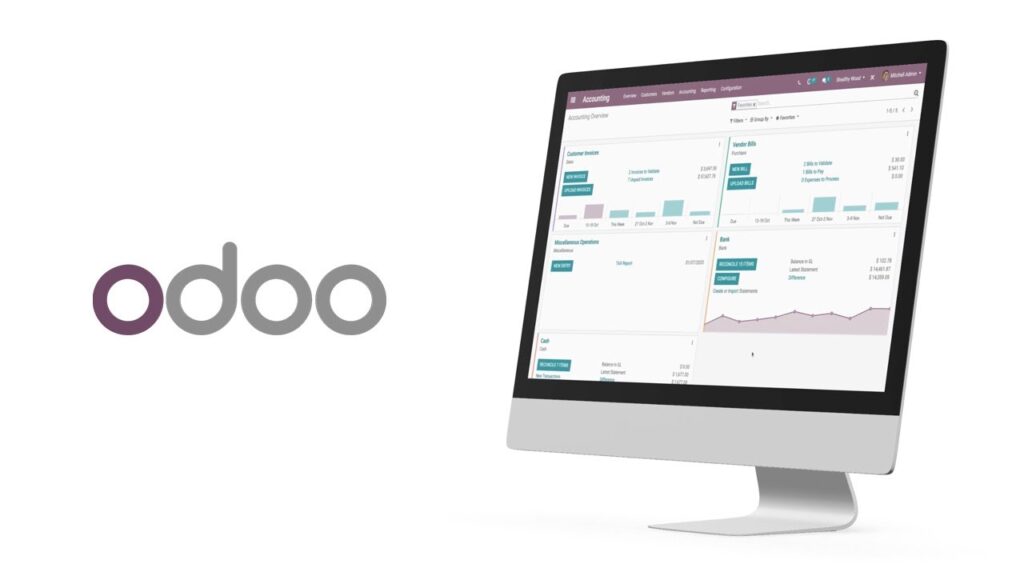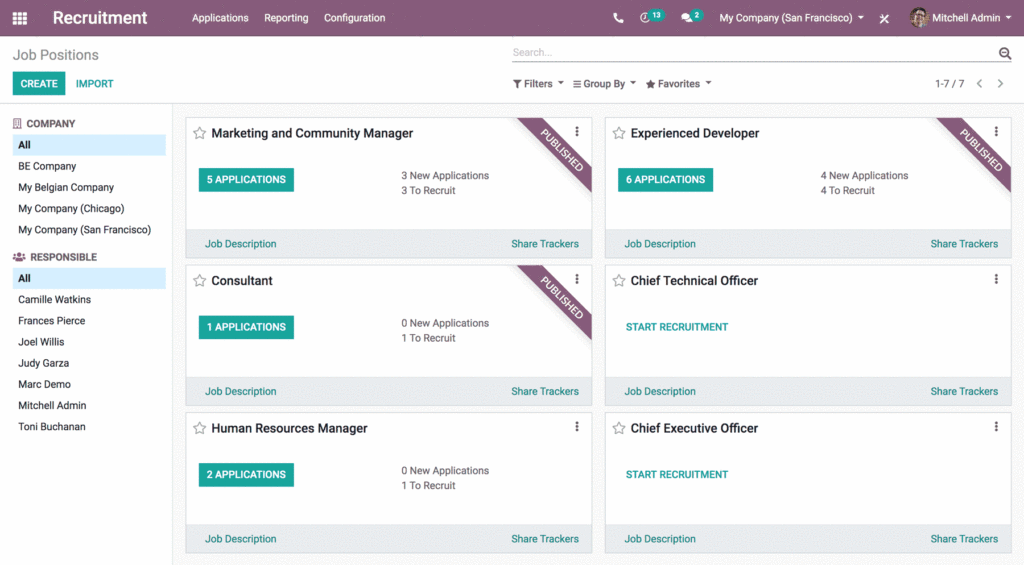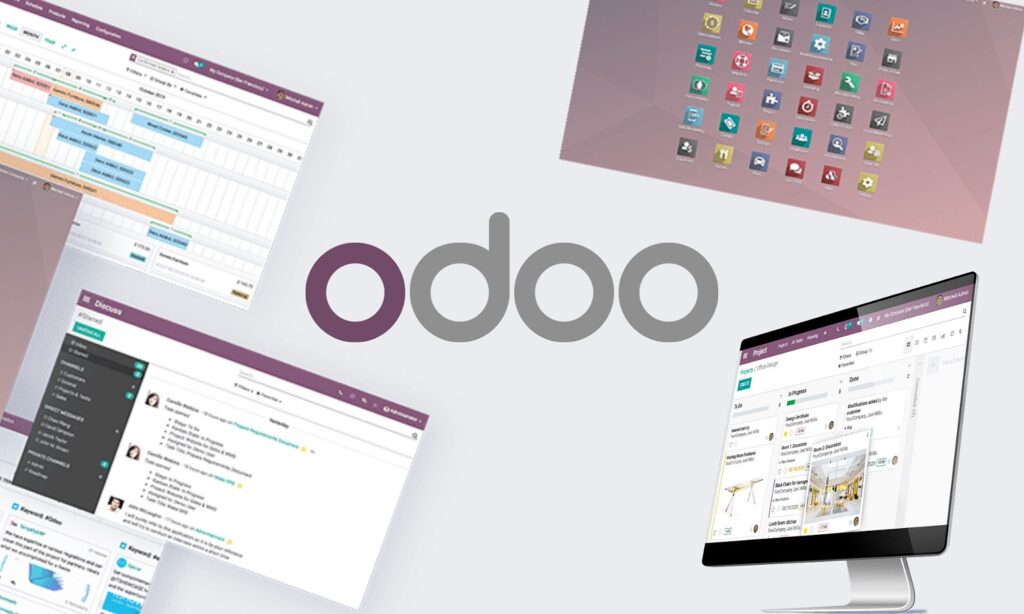If you’re wondering whether Odoo is open source, the answer is yes.
Odoo is a suite of open-source business apps that cover all your company needs. These include CRM, eCommerce, accounting, inventory, point of sale, project management, and more.
The open-source development model of Odoo has allowed the company to leverage thousands of developers and business experts. They come together to build the world’s largest ecosystem of fully integrated business apps.
In this article, we will explore what it means for Odoo to be open source. We will also see how this benefits small and medium-sized businesses looking for a cost-effective and modular solution to their business needs.
What is open-source software?
Open source software is computer software that is developed as a public, open collaboration and made freely available to the public.
It refers to software with source code that anyone can inspect, modify, and enhance.
Open-source software allows users or other developers to use, study, change, and distribute it for any purpose.
Key characteristics of open source software
Source code availability: Open source software provides access to its source code, allowing users to view and modify it.
Collaboration: Open source software is developed through a collaborative process, where developers from around the world contribute to its improvement.
Freedom to modify: Users have the freedom to modify the software according to their needs and preferences.
Redistribution: Open-source software can be freely distributed to others without any restrictions.
Transparency: The development process and decision-making in open-source projects are transparent and open to the community.
Meritocracy: Open source projects often operate on a merit-based system, where contributions are recognized based on their quality and value.
Advantages of using open-source software
Cost-effectiveness.
Flexibility and customization.
Security.
Community support.
Innovation and rapid development.
Overview of Odoo
Odoo was founded in 2002 by Fabien Pinckaers. He had a vision of leading the enterprise management market with a fully open-source software product.
Originally known as OpenERP, the company changed its name to Odoo in 2014. That aimed to reflect its broader range of business applications beyond ERP functions.
Over the years, Odoo has experienced significant growth and has become the fastest-growing business software package in the world.
Today, Odoo has more than 5 million users worldwide and is released in over 100 countries.
Odoo’s core functionalities and modules
Odoo is a comprehensive suite of business applications that cover various company needs. These include CRM, eCommerce, accounting, inventory, point of sale, project management, and more.
It offers a wide range of modules that can be customized and integrated to create a tailored solution for businesses.
The modular nature of Odoo allows users to select and implement only the modules that are relevant to their specific requirements.
With the availability of tens of thousands of community apps, Odoo provides a single, cost-effective, and modular solution to address diverse business needs.
Popularity in the business software market
Odoo has gained popularity in the business software market due to its open-source nature and comprehensive functionality.
It is used by over 5 million users, ranging from startups to enterprises.
Odoo’s open-source development model has allowed it to leverage thousands of developers and business experts, resulting in the world’s largest ecosystem of fully integrated business apps.
The flexibility, customization options, and cost-effectiveness of Odoo make it an attractive choice for small and medium-sized businesses.
Odoo’s Licensing Model
Odoo is distributed under the terms of the AGPL (Affero General Public License) license.
The AGPL license requires that any modifications or custom modules made to Odoo must be open-sourced under the same license.
Odoo Enterprise users are allowed to ask for a special license called the “OpenERP AGPL + Private use”.
This license is the original open-source AGPL license with one additional permission: an exception to section 13 of the AGPL.
It allows to making of private modules without having to give the corresponding source to the users. This applies as long as the modules are kept private and not distributed to third parties.
Different editions of Odoo
Odoo offers two editions: Community and Enterprise.
Odoo Community is the free and open-source edition of Odoo. It is available for general-purpose use by anyone.
Odoo Enterprise is the paid version of Odoo that offers additional features and support services.
Both editions are fully customizable and modular. As a result, this allows businesses to select and implement only the modules that are relevant to their specific requirements.
Key differences between the editions
Odoo Enterprise offers additional features and support services that are not available in the Community edition.
Odoo Enterprise includes enterprise-level features. These include advanced inventory management, project management, and HR management.
Odoo Enterprise offers official support services. These include bug fixing, security patches, and version upgrades.
Odoo Community relies on community support, which may not be as reliable as official support.
Odoo Enterprise is suitable for larger businesses that require advanced features and support services.
On the other side, Odoo Community is ideal for small and medium-sized businesses that require basic functionality and customization options.
Why is Odoo Open Source?
The open-source development model of Odoo encourages a dynamic and adaptable system that can grow and evolve with the needs of its users.
The open-source model also allows for a large community of developers to contribute to the development of the software. Henceforth, it results in a robust and comprehensive suite of business applications.
Advantages of Odoo being open source
Cost savings: The open-source nature of Odoo means that businesses can use the software for free. Therefore this reduces the cost of software acquisition.
Customization: The open-source model allows businesses to customize the software to meet their specific needs and requirements.
Flexibility: The modular nature of Odoo allows businesses to select and implement only the modules that are relevant to their specific requirements.
Security: The open-source model allows for thorough code review and identification of security vulnerabilities. Consequently, this results in a more secure software product.
Community support: The open-source model fosters a vibrant community of users and developers who provide support, documentation, and troubleshooting.
Innovation and rapid development: The collaborative nature of open-source software development fosters innovation and leads to faster updates and improvements.
Features and capabilities of the Odoo Community Edition
The Odoo Community Edition offers foundational modules for various operational areas such as sales, CRM, and inventory management.
It also comes with a wide range of features, including accounting, inventory management, CRM, project management, and more.
The platform offers a vast selection of third-party apps, modules, and plugins. As a result, they enhance the features and capabilities of the existing solutions built using Odoo.
The Community Edition of Odoo is entirely open-sourced. This means that anyone can access and modify the source code of the software.
Advantages and limitations of using the Odoo Community Edition
Advantages
The Community Edition is entirely free to use, making it an ideal choice for startups and small-scale enterprises.
It provides all major modules and features that would generally suffice to address all the basic needs of an enterprise.
It is fully customizable and modular. Consequently, it allows businesses to select and implement only the modules that are relevant to their specific requirements.
The platform offers a vast selection of third-party apps, modules, and plugins. As a result, they enhance the features and capabilities of the existing solutions built using Odoo.
Limitations
Customization options are limited compared to the Enterprise edition.
Community support may not be as reliable as official support.
Users are advised to have an in-house technology team capable of implementing and maintaining the ERP system. Otherwise, they can seek additional support from one of the official Odoo partners.
Commercial aspect of Odoo
Odoo’s Business Model and Revenue Sources
Odoo’s business model follows an open-core approach. It hence features an open-source core software with additional features and support services available in the Enterprise edition.
Revenue streams include sales of the Enterprise edition, support services, training, and consulting.
Odoo operates a marketplace for third-party developers to sell apps and modules, earning a commission on each sale.
Odoo’s Strategies for Sustainability
The open-core model allows Odoo to offer a free open-source version. It also generates revenue from the Enterprise edition and support services.
Odoo offers a comprehensive suite of business applications. Hence, it serves as a one-stop solution for diverse business needs.
The modular approach lets businesses select and implement only relevant modules, reducing acquisition costs.
A robust community of users and developers provides support, documentation, and troubleshooting.
Conclusion
In conclusion, Odoo is a powerful and cost-effective solution for small and medium-sized businesses.
By leveraging its open-source development model and modular approach, Odoo offers a comprehensive suite of business applications that can be tailored to meet the specific needs of businesses.
The benefits of using Odoo include improved decision-making, increased productivity, data transparency, and affordability.
Odoo’s community-driven development and vibrant ecosystem contribute to its success. It also makes it a valuable tool for small businesses looking to streamline their operations and gain a competitive edge in the market.






